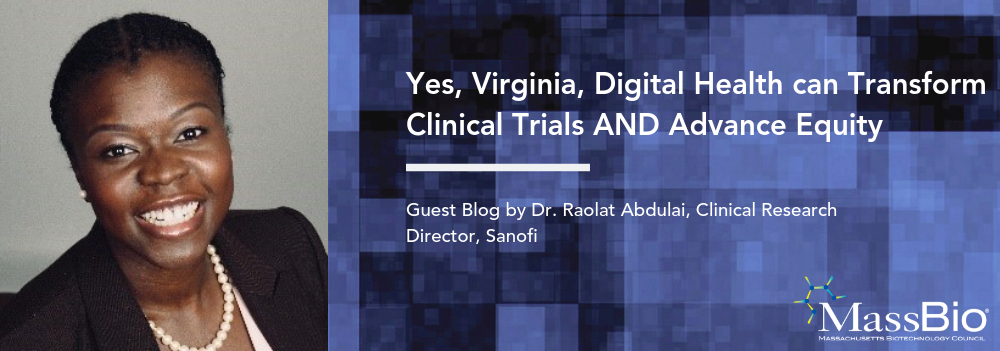
You may have heard that people of color are suffering from serious underrepresentation in clinical trials. Yes, we know that clinical trials have issues beyond diversity. In fact, a 2014 report by the Department of Health and Human Services quite elegantly outlined the issues that are presenting barriers to more efficient drug development. Specifically, the difficulty of recruitment and retention in clinical trials can lead to significant delays and financial consequences. The report also pointed out solutions for industry, including the use of digital tools such as electronic health records (EHR) for patient recruitment, electronic data capture (EDC) systems to streamline trial information, and tools for performing trials at home (“clinical trial in a box”) to reduce costs and improve retention. Five years later, this summary of the barriers and solutions for improving the conduct of clinical trials highlights the innovative measures currently being taken to make clinical trials more patient-friendly. But how can we make the digital evolution work for all patients? For example, Black/African American patients represented a mere 2.74% of all patients in oncology trials (FDA Global Participation in Clinical Trials Report) and only 4% of patients enrolled in trials for the oncology drugs approved in 2018 (FDA Drug Snapshot). As of 2016, Black men are about 20% more likely to die from cancer compared to their white counterparts (DeSantis, Miller, et al. 2019). Luckily, this gap has narrowed from almost 50% in 1990, likely reflecting changes in practice, new treatment options, and increased healthcare access. Yet the fact that the disparity still exists highlights the stark lack of appropriate representation in clinical trials. This disparity goes against the premise of one of the three Basic Ethical Principles: Justice, the fair treatment and distribution of benefits. Back to the initial question: can the digital evolution of clinical trials improve diversity? Yes and in three specific areas.
Study feasibility and patient recruitment
After the passage of the Food and Drug Administration Amendments Act of 2007 (FDAAA 801), the law that requires drugs, biologics and device trials to be registered on ClinicalTrials.gov, the number of trials significantly increased from ~65,000 in 2008 to >300,00 as of August 2019. This astronomic increase, invariably triggered by the new regulations and publications policies, has led to increased competition for both investigators/sites and patients. Platforms such as TriNetX and PatientsLikeMe have evolved our understanding of the hubs of patients with particular diseases. This is helpful for studies involving rare diseases where patient recruitment depends significantly upon locating clusters of patients and centers of excellence. Outside of rare diseases, we can use these type of tools to identify the best clinical sites for patients with diverse backgrounds. Even more disruptive is the use of social media like Twitter and Instagram to facilitate recruitment of populations because of the high uptake among people of color. While we need to ensure the veracity of the information posted on these platforms, using them to facilitate recruitment may literally change the face of our clinical trial participants.
Remote/virtual trials
But who needs clinical trial sites? The second way to aggressively tackle diversification would be to move the dial on decentralization of clinical trials. Science37 and Evidation are amongst the companies that are leading the way in a radical shift: performing site-less studies. Unlike traditional trials, these studies do not require a physical location for the entirety of the trial (or at least a large portion). Remote trials can perhaps be transformative for their potential to ignite the diversification of clinical trials, a point recently iterated by the FDA. Aside from the traditional barriers such as mistrust and stigma, hurdles like travel time, transportation costs, and office wait times affect the patient experience. Such impacts are felt disproportionately by populations that are already at a socioeconomic disadvantage. Remote trial may also provide work against the issue of implicit bias that minorities may face when attempting to receive healthcare or participate in clinical trials. Furthermore, remote trials can open the doors to populations in emerging economies. For instance, in Nigeria and South Africa, internet use is growing through the increased penetration of mobile devices. This access point provides an opportunity to include patients traditionally left out of non-vaccine studies to participate in broader drug development trials. The impact on the scientific knowledge and innovation may be enormous.
Digital assistants and wearables
Finally, like 46% of Americans, I use a digital voice assistant on a daily basis. They keep me up to date on the weather, traffic, and remind me of appointments. These devices can be also be used in clinical trials in order to improve the patient experience. Wearables are being used in clinical trials for monitoring activity, heart and lung function, and neurological changes, amongst others. Digital personal assistants and wearables may be used to provide study-related information, capture adverse events, and detect efficacy. Together, they add to the feasibility of remote studies which can then further facilitate recruitment of diverse populations by reducing barriers to clinical trial participation such as transportation.
For the digital evolution of clinical trials using disruptive technology may ultimately bend the trajectory of drug development towards equity and fair distribution of the benefits of clinical research. However, it will be up to us to use these tools to further advance the cause towards achieving this form of justice.
To hear more from Raolat, register for MassBio's first-ever Digital Health Impact 2019 event.
The views and opinions expressed in the blog post are solely that of Dr. Abdulai and should not be attributed to her employer.